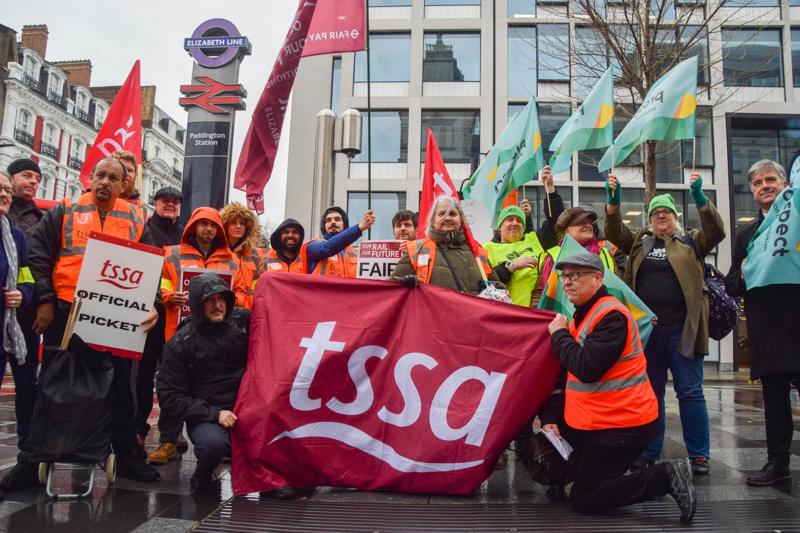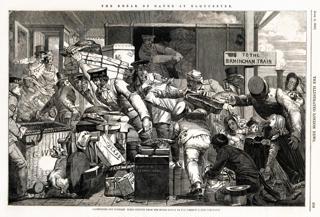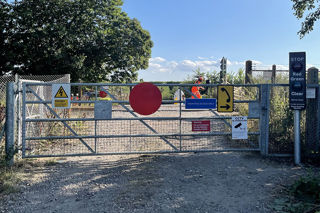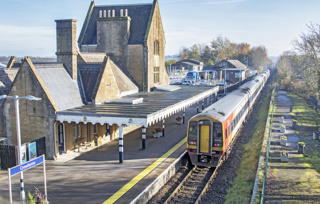How will the unions work with the new government and a future Great British Railways? Joe Campbell reports.
In this article:
How will the unions work with the new government and a future Great British Railways? Joe Campbell reports.
In this article:
- Rail unions welcome the new Labour government's engagement, contrasting it with the previous administration's lack of cooperation.
- Union leaders support Labour's plans for public ownership of railways but are concerned that the strategy doesn't go far enough.
- Progress depends on convincing the Treasury to invest in long-term infrastructure and reforms for the benefit of workers and the public.

The front page of ASLEF’s journal for July said it all. Written by General Secretary Mick Whelan, the headline read: “All change please!”
This was a Labour-supporting union echoing the party’s campaign slogan. No big surprise there. But the exclamation mark summed up the mood across the unions: a desire not just for a change in policy, but also new faces sitting behind the ministerial desks.
That was something uniting all three unions representing the majority of people who work on Britain’s railways - not to be confused with the new government’s Great British Railways, and certainly not the Conservative vision for an entity with the same name but with a very different mission.
“We were incredibly pleased that one of the first things that the government chose to do was talk to us,” says Whelan.
“We had 16 months of basically being ignored,” he adds, referring to the pay dispute, which he described as “the longest industrial dispute in the history of the railways”.
As he spoke to RailReview, Whelan was preparing for his third meeting with the new government.
“Let’s look at the timeline. They were elected on July 4. They appointed Lou [Transport Secretary Louise Haigh] on July 5. They appointed Peter Hendy [new Rail Minister] on July 9. We met them on July 10, so within seven days we met their new negotiating team.
“I think, I couldn’t have asked for anything more than what I’ve had in response. Now it all comes down to what the offer is, doesn’t it?”
Sure enough, within a matter of days ASLEF announced that following two further meetings, it had received an offer it was willing to put to members of 5% for 2022-23, 4.75% for 2023-24, and 4.5% for 2024-25 backdated and pensionable.
The big sticking point had always been terms and conditions. Insiders laid the blame at the door of the Rail Delivery Group (RDG), which “had wanted something for nothing”.
Now the RDG is no longer at the table. However, while that has made a big difference, the political changes cannot be underestimated.
“Rishi Sunak wasn’t interested in railways,” says Whelan.
Worse still, in his view, for all the talk of wanting reform, there had been no real plan. He cites the pressure for changes over Sunday working, saying 12 of the 14 train operating companies affected by strikes either already had agreements for it to be considered as part of the working week, or arrangements to ensure turns were covered. It was, in his view, “just dogma and spite”.
“We have gone from people behaving dishonestly and deceitfully and trying to rip up all our T&Cs, to a group of people who seem to understand the interests of rail workers, the travelling public, and the taxpayer.”
It’s a sentiment echoed by Maryam Eslamdoust, head of the TSSA union, contrasting dealings with the last government.
“I would say that it really wasn’t a working relationship. We would write to them. We’d get a standard response back from a low-level civil servant. There wasn’t much engagement.
“But with this new government the engagement has been positive. We are confident that it will be even better in the longer term.”
RMT General Secretary Mick Lynch was the only one of the three union leaders not to talk to RailReview in person. In a statement issued on his behalf, RMT also welcomed the new team, particularly after seeing which manifesto promises had made it into the legislative programme.
“Labour have made a good start and have begun to roll out public ownership of the railways. They have stated their intention to carry out the new deal for workers, too,” it said.
“We will be pushing them on insourcing, which is a major issue for our members in contracted-out cleaning, catering and facilities management roles. They are superexploited by massive private contractors that should not be operating on the railway.”
Bringing the remaining privately-run train operating companies into public ownership has been a key target for all the unions.
“In an ideal world I’d want it all back tomorrow,” says ASLEF’s Whelan.
“I believe it can be done quicker, but have we got the capacity to do it? Also, are we going to go back to some Inter-City type, inter-urban, regional railways-type system?”
The last time the railways were in state hands, Britain took more than 30 years to get from nationalisation to sectorisation. Deciding on the business model this time can build on BR’s experience and the lessons learned post-1997 - the industry has harked back to a previous age, bringing back familiar brand names such as GWR and LNER.
That underestimates the complexity of almost three decades of private ownership. The unions say the transfer of staff between existing franchise operators and new ones, who had then gone on to change terms and conditions for new recruits, means that even within a single operator there can be staff on a range of contracts doing the same job.
Noticeably absent from the plans for state ownership were the rolling stock leasing companies (ROSCOs). This is an area where the TSSA says Labour’s plans “didn’t go far enough”.
“On rolling stock, obviously it’s been disappointing that there’s been no intention to bring them back,” says Eslamdoust.
“We accept that we won’t get everything in one term. We’re prepared to take it one step at a time, work with this government, and show them that full integration of the rail system is the only way of achieving everything that they want on climate change, on boosting regional equality.
So, while it’s not everything that we’ve asked for on our shopping list, we’re prepared to work with the government to achieve this longer-term goal”
The RMT would also have liked to see action, saying in its statement: “The ROSCOs are a perverse financial trick played on the tax and fare payers, and Labour over time will need to devise a plan of how to deal with them.”
All three unions seem to accept they are battling against Treasury fears that this would be a step too far. Whelan also says there were concerns that it could have involved ministers in “horrendous litigation”.
Significantly, given his position on Labour’s National Executive Committee, he already has a vision of an alternative route to the same destination.
“Procurement will become a new thing,” he explains, looking to a future railway controlled by Great British Railways.
“We pay for the trains: we should hopefully own them.”
Whelan takes his cue from Steve Rotherham, the Labour metro mayor on Merseyside.
“It’s not really on the same scale, but he’s always owned his own trains on Merseyrail. A few teething problems, but they’re now off the ground and they pay for themselves in five years.
“That means he’s got a 35-40-year shelf life, where the money he makes on those trains can be invested in further new trains or other things to do with Merseyrail. Surely having that money coming back in is better than it constantly draining, going out?”
Eslamdoust acknowledges the role that HM Treasury plays: “It is cautious about upfront capital costs in terms of achieving a fully integrated rail structure, but the public is onside.
“They just need to be convinced that the investment is worth it in achieving the government’s ambitions. So, for that longer-term goal to be achieved, I think the Treasury need to be convinced - and I think they will be - that the investment is absolutely worth it.”
Whelan notes: “What we will have is a number of Secretaries of State all banging on the door of the Treasury. But for every £1 you put in transport, £5 comes back to the economy. Even at the worst of COVID it was 1:2. You don’t get that return anywhere else.”
Whelan, the man who heads the Labour unions group, is keen to dovetail the party’s and ASLEF’s ambitions. On reducing poverty, he proposes cheaper public transport to help towards that goal.
Meanwhile, the RMT says: “Labour will need to spend money in the economy in order to fulfil the mission it has set itself.
“Setting Conservative fiscal limits is an ideological decision, not a practical one. There is a lot of money in the economy, with a record amount of super-rich in British history.
“So, the government should find ways through progressive taxation to fund our public services, give decent pay rises to workers, and make the economy function for the benefit of working people more generally.”
The different tones will be familiar to the new Rail Minister Lord Peter Hendy. He clashed with the RMT both at Transport for London and Network Rail.
Meanwhile, the TSSA is keen to brush over past disputes.
“There were some issues at various points, but I think we’re confident that he knows the industry and the challenge, so we’re very much looking forward to working with him,” says Eslamdoust.
While the government at Westminster has changed, the devolved administrations remain the same. And as current disputes prove, greater public involvement is no guarantee of a network free of industrial action.
The scrapping of minimum service level rules is likely to have little impact, given the reluctance of firms to use them. But the more integrated and publicly owned railway plans, along with greater political involvement, have bought the new government a degree of union goodwill.
Talk of a “honeymoon period” is dismissed by the RMT. The statement on behalf of Mick Lynch, the only one of the General Secretaries with no formal links to Labour, said: “We have a Labour government, they have made promises. If they keep them, we will support them, and where they do not go far enough, we will encourage them to do so.”
TSSA’s Maryam Eslamdoust insists that members’ interests remain the priority. “We won’t be offering a blank cheque to the government,” she adds.
Mick Whelan has renewed hope. He had hoped he would finish his time as ASLEF General Secretary in a year and a half with rail’s future embedded, due to the pressure to decarbonise: “I’ve got this thing that railways are fields of dreams, to use the Kevin Costner saying. ‘If you build it, they will come.’”
Login to continue reading
Or register with RAIL to keep up-to-date with the latest news, insight and opinion.

















Login to comment
Comments
No comments have been made yet.